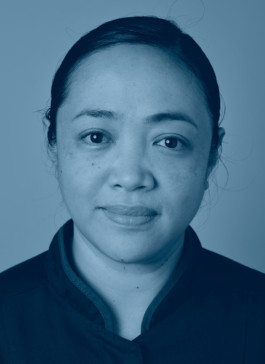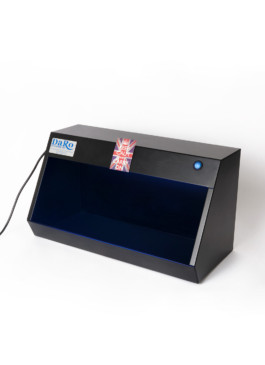Grace: “As nurses we will continue. I’m so proud to be one of them”


listen:
Photography: Lottie Davies
Audio Producer: Joshan Chana
read:
Honestly, I would say that when I was in high school I didn’t want to become a nurse.
I wanted to become an accountant because I thought I was good in numbers. I went into nursing initially because I thought – I told myself – we didn’t have enough money. My sister already has this big book about nursing. I will use them so my mom don’t, doesn’t have to buy me any more books for any other course.
My name is Grace Nabus. I am a senior nurse with responsibilities in coordinating training for the learning and development of care and nursing staff at the Royal Hospital Chelsea.
In the Philippines, you would find that there is a lot of nurses. People go into nursing not just because we have that innate nature for caring for other people, but also because people view nursing as a way to improve their lives financially. It is easier for people back home in the Philippines to go abroad if they are nurses. It’s like a universal profession.
I work at the Royal Hospital, Chelsea, the home of the Chelsea pensioners, and I’ve worked here as a nurse for 14 years. The Chelsea pensioners, they are army veterans. Most of the Chelsea pensioners are actually independent, living in the Royal Hospital Chelsea grounds independently and they don’t need any care. But where I work, in the building where I work, we provide care for the Chelsea pensioners who need more care and support.
I was surprised to see a very vibrant community. It’s like everybody would say hello to you when you come to the gates. People you don’t know say hello. It’s like being in the Filipino community also where everybody says hello to each other. And at one time, I have my nephews and nieces with me, and we were just walking through the Royal Hospital Chelsea, and they saw the Chelsea pensioners in their uniform. And one of my young nephews said, ‘Oh, Aunty, look at these people, they’re already old. Why do this country let them still work?’, and I said, ‘No, they don’t work here. They actually live here’.
What I was feeling when we first had cases here at the Royal Hospital, Chelsea is that I had that sense of great fear. Because I know that a lot of the Chelsea pensioners like travelling, a lot of them are abroad. And I was thinking, ‘Oh gosh, they’re going to come back and they’re going to have the virus and it will eventually spread here’. So the first case that we have, within the Royal Hospital, Chelsea, is in what we call the Long Wards. It is not the building where I work, but it is where they live independently. We were isolating them. And they know, they understood that they have to be isolated. We were looking after them in their rooms.
There’s a total of 10 pensioners that died during the pandemic. And five of them died here in the building where I work and five of them died in hospital.
It’s particularly stressful, especially so that, in my role, I have also to support the more junior members of staff, listening to their fears and listening to their anxiety. Sometimes I wouldn’t know how to comfort or support them as well. They were very anxious about PPEs. Our PPEs at that time, in March, were not enough because we were only given just one per day, one mask per day. You know, I was very worried about myself, because I know I have a respiratory condition is well. I am very sickly. My husband was very worried. My mum was very worried. I told them that I am doing my best to protect myself. When they told me that I need to do training again on infection control I asked if I could have that hand washing inspection machine and they said yes, so we purchased it, because I’ve been wanting to have it in infection control training.
It’s also a very fun activity to do with the staff, inspecting hands. Yeah, it’s like, ‘Ah, look, you haven’t washed your nails properly. Go and wash again’, things like that. And they would say ‘Oh look, your wrists are still awful. Go and watch them again’.
I was very, very impressed by how the Chelsea pensioners actually reacted to the Covid. Nobody has complained about the restrictions, people were just happy to isolate in their rooms. Some of them actually said they have experienced worse than this. So this is just like nothing. In one ward in particular I, when I went down there to help with their meals, the Chelsea pensioners, because of the lack of staff, were also serving breakfast for the other Chelsea pensioners. And it’s such a great community. It’s such a great thing to witness as well, at that time. They know me by name, it’s like ‘Hi Grace’, or when I walk in the morning, I would see them waving up there from their window and they say, ‘Hello, Grace. Good morning’.
In the media, there were reports that there is a high number of Filipino deaths during the pandemic. There were a lot of Filipino nurses who died. It’s very, very sad. But I think it’s also because how caring is like in our nature, and being helpful as well, you know. I don’t think that the Filipino nurses would say ‘No’, when the manager would tell them to stay in the Covid ward. They would always say ‘Okay, yes, I will do it’. And also, as a Filipino nurse, you tend to do overtime to earn more money, because you’re not only caring for yourself or your family in here, but you’re also sending money to your family back home. And as you already know, nursing is not a high paying job anywhere in the world. So as a nurse you, to earn more money, you tend to do more overtime.
Would I be able to do the same things? Be as brave as I was? As this the first wave I am not sure. I don’t know. Will I get sick? I don’t know. Well, the things that I have done for myself, like keeping up with with my walking, with my daily exercise, with my vitamins… would that be enough to protect myself? I don’t know.
I would say to the people that being a nurse is both difficult and rewarding. Being a nurse at the midst of the pandemic was challenging. But it’s also rewarding. Having survived the pandemic, and having cared for people to survive the pandemic also – that has been rewarding, and it was made more meaningful by people clapping for key workers.
As nurses, we will continue. Yeah, yeah, I do. No, I’m proud to do.
Though there’s probably a reason why I didn’t become an accountant.
An Empathy Museum project made with the support of NHS England and NHS Improvement, The Health Foundation, and Arts Council England